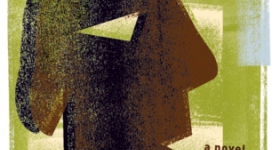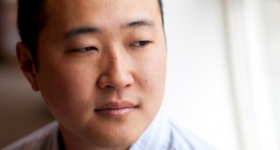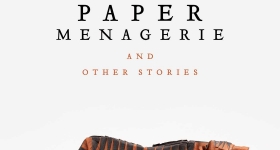For this week’s edition of the Hyphen books blog, books contributor Jee Yoon Lee interviews Marjorie Liu, author of the fantasy fiction series The Hunter Kiss, which -- get this -- features a Katniss-esque female protagonist whose tattoos (literally) jump off her skin to form a demonic army. Liu is also a writer for comic books series including the Astonishing X-Men and Dark Wolverine, and wrote the story for the recently released animated film Avengers Confidential: Black Widow & Punisher. In the followiing interview, Liu talks about the process of writing the serial novel without the "passive info-dump" technique and the balancing acts involved in creating storylines that team up multiple superheros.
Hyphen: Labyrinth of Stars, the latest in your Hunter Kiss series, takes your readers into the urban fantasy world of Maxine Kiss in perhaps her final struggle to save those most dear to her. When writing a book that's part of an ongoing series, how do you strike the right balance between writing for readers new to your series and writing for those who have been with you the whole way?
Liu: I let the characters do most of the work in setting the stage, which is the proactive method. So much can be established through a simple conversation, or observation, [which is] better than the passive info-dump, which I try to avoid as much as possible. Sometimes there's no choice but when that happens I keep it short. Striking the right balance is still difficult, though, especially when the series is long-running. I had a lot of practice writing standalone novels with my first paranormal romance series [which was] about shape-shifters, psychics, mermen, and other creatures of legend, all hiding out in our modern day world. Each novel maintained a certain degree of continuity from previous titles, but my job was made easier because the stories focused on a different set of characters every time, creating an easy opportunity for me to reset the stage for new readers (and create reminders for old ones).
That wasn't the case in the Hunter Kiss series, which follows just one character, Maxine. The lens had to stay tight on her and her friends, and each book revealed truths and created personal relationships that had to be addressed down the line. By this last novel I felt that I was walking a tightrope of continuity issues. I couldn't expect readers to remember everything, or even know what had brought Maxine to that particular place, so I had to paint that history with just enough detail to set the scene but not so much that the book would read like a wikipedia page.
For the recent animated film, Avengers Confidential: Black Widow & Punisher, did you write the story before it went to the screenplay writer (Mitsutaka Hirota)? Or was it more of a collaborative process between the two of you?
I wrote the story first, which in itself was an interesting experience. I'd never written for television, but creating a comic book is good training. Not simply because of the script format that we write in, but because it's a very visual process. And in this case, there was a great deal of fuel for the imagination, especially with two characters like Black Widow and Frank Castle.

The writer, Marjorie Liu (photo credit: Nina Subin)
How did you come to work on the Astonishing X-Men series? What challenges do you face when telling stories about the X-Men with long histories?
It was simple, really. The Marvel editors approached me to write Astonishing X-Men just as my X-23 run was ending. Of course I said yes! I'd been dying to write the X-Men for years, and even though I'd had the chance to create stories for individual characters in other books, the idea of a team title was incredibly exciting. A challenge, yes, but the difficulties didn't come from their long histories. I had to learn how to write about multiple characters with multiple relationships, working together as a unit, which seemed straightforward at the outset, but required a bit of a learning curve. I find newly emergent characters to be very exciting, actually. Because they don't have a long history, I get the chance to shape their origins, to build a foundation for them. That was the case with Warbird (a member of my Astonishing X-Men team), and she became one of my favorites to write.
This summer you'll be running the VONA/VOICES Workshop at UC Berkeley for popular fiction. What approach do you take in teaching your workshop?
What I attempt to do when working with writers in a workshop is create a greater awareness of how stories function. Or, to put it another way, stories offer certain profound pleasures for readers--from character and plot, to voice and world-building -- and if all, or one, of those beats is missed or underdeveloped, then there's a fracture in the work that needs to be fixed. Workshops are helpful for pointing out our persistent weak spots. I also tell students to read as much as possible, the good and the bad, from novels to poetry to magazines. Language in all its forms is a tremendous teaching tool.
Have we seen the last novel in the Hunter Kiss series? What project can we look forward to next?
This won't be the last story set in the Hunter Kiss universe, though it might be the last story in this current format. Over the course of five novels and two novellas I told a full arc of Maxine's journey and the second part will be a vastly different kind of story, one that might be told as a graphic novel, or in several bursts of short fiction. There's also the story of her daughter that needs to be told, and even the boys themselves -- those demons who live on her skin -- have their own history that I never really addressed.
But I have other projects on the horizon: creator owned comics and more novels. In fact, I'm in the middle of revisions for a novel about an elderly dominatrix who discovers someone is trying to murder her and ropes in her Iraqi vet granddaughter to help solve the mystery. I'm having a lot of fun writing that one.
-
Jee Yoon Lee teaches at the George Washington University and maintains the blog writinglikeanasian.blogspot.com.









Comments